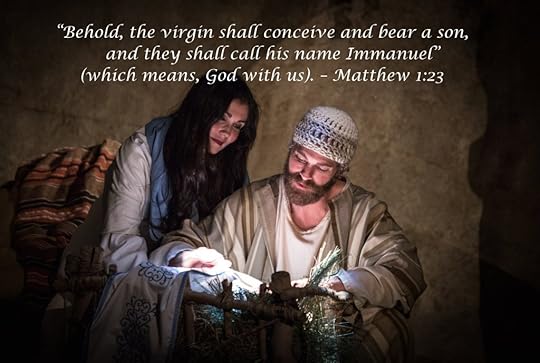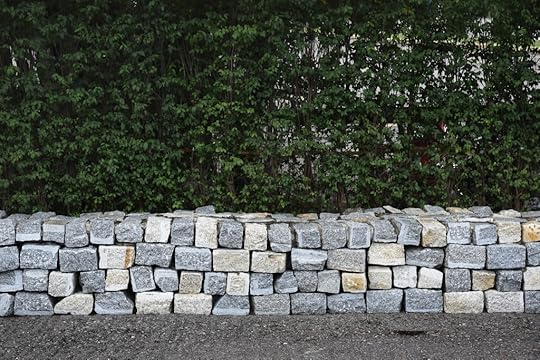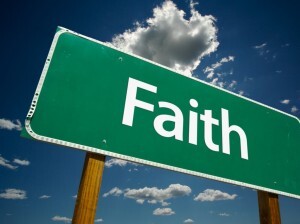Michele Huey's Blog: God, Me, and a Cup of Tea
December 14, 2024
3rd Sunday of Advent – What Happened To Your Joy?
What has happened to all your joy? – Galatians 4:15 (NIV)
When we moved to the country 45 years ago, we planted three kinds of fruit trees. I had visions of homegrown apples in bowls on the counter and sparkling jars of fresh canned peaches and pears.
For the most part, though, the vision remained just a dream. The apple trees never bore fruit, never grew more than three feet high, thanks to the deer. The peach tree produced luscious peaches for a few years then shriveled up and died.

The only fruit trees remaining are two pear trees. One is dwarfed—I think because my son shot an arrow through it when it was still quite young. The other is leafy and laden with fruit come late summer, but the pears are small, misshapen and marked with black dimples.
To produce more and better fruit, the trees needed to be cultivated and nurtured. The problem is we don’t have a clue. Or maybe it’s because we haven’t made the trees a priority. Until we get serious about those trees, until we take the time to learn how to care for them and then do it, the trees will struggle along, producing little usable fruit.
I tell you this story because, like fruit trees, the fruit of the Spirit also needs to be cultivated and nurtured.
Take joy, for example.
If there is anything missing from society today, it’s joy. Just look at the faces of people you see every day. Even believers, who should be oozing joy, are not. Joy should set us apart right off the bat.
Do you remember the joy you had at salvation? Overflowing, spilling out, you couldn’t contain it. Then little by little, life robbed you of that joy.
Life is going to happen. Although we can’t control it, we can control our reaction to it. We can choose joy. We can make it a priority and nurture it.
How?
First, be aware of the joy stealers that chomp away at it or shoot it right in the heart. “If a homeowner knew exactly when a burglar was coming, he would not permit his house to be broken into” (Luke 12:39 NLT). Know the burglars will come. Don’t let them in.
Forgetfulness is one of those burglars. Stuck in the mire of this earthly life, we forget our past and our future: from what we’ve been saved and what awaits us in heaven.
Legalism is another joy stealer. Religion—all that we do to try to earn heaven binds us. Heaven can’t be earned: For it is by grace you have been saved, through faith—and this is not from yourselves, it is the gift of God—not by works, so that no one can boast.) Relationship—our personal relationship with God through His Son—frees us.
Unconfessed sin, disobedience, worry, anger, people and life are other joy stealers.
Being aware of these thieves will make you more alert when they try to rob you. And when they do, don’t let them in.
How can you replace the joy you’ve lost?
Simple: Ask the joy-giver—God Himself—to fill you with His joy and help you to sustain it. Seek His presence (“In your presence is fullness of joy.” – Psalm 16:10).
Choose joy. Nurture and cultivate it. Then spread it around, letting it overflow, spilling over onto those around you.
As we light the third candle on the Advent wreath — the pink one, which represents joy—may we remember that the joy of the Lord is our strength (Nehemiah 8:10). Amen.
Read and reflect on Galatians 5:22–23.
© 2015 Michele Huey. All rights reserved.
December 7, 2024
2nd Sunday of Advent – Expectations

She gave birth to her firstborn . . . and placed him in a manger, because there was no room for them at the inn. – Luke 2:7 (NIV)
My husband’s a hard worker, so I try to ease the workload around the house when I can. Sometimes, though, my efforts make more work than if I’d just let him do the job in the first place.
Wanting to surprise him, one year I decorated the front deck with pine garland and white Christmas lights. That was the first year we had a deck to decorate, and the coffers had taken a hit with building front and back decks that summer and re-roofing the house. So the least expensive garland and light string I could find, I got.
I wanted him to come home from work and “ooh” and “ahh” over how it looked or at least show appreciation. Instead he said nothing. When my husband says nothing in a situation like this, I assume he doesn’t like it and he doesn’t want to say anything because it’ll just get him in trouble. Which it did. Because I squeezed the truth out of him—so I really shouldn’t have been mad, right?
After a couple of days, I broached the subject, and we discussed how the front deck decorations could be improved. I do admit, he’s a much better decorator than I am. He has both the eye and the touch. My decorating philosophy is the same as my baking philosophy: throw it together and hope it turns out right.
“It’s not that I don’t like it,” he told me. “It’s just not what I expected.”
Expectations—that’s what this was all about, not who was right and who was wrong. I expected him to lavish praise on my efforts and was disappointed when he didn’t. He expected thicker boughs, something that stood out more, and was disappointed when the reality didn’t match the vision. Once we talked about it, the air cleared.
Expectations weren’t met when Jesus came, either. He was born not at home, but in a town 70 miles away, in a stable because the inns were full of travelers coming to pay their taxes. No family gathered around the new parents to rejoice with them, only strange shepherds and even stranger foreign dignitaries. And when He grew up, Jesus didn’t fulfill the expectations of anyone but His Heavenly Father. Even His death caused crushing disappointment for all who expected something different. But the reality was so much more than they ever could have dreamed!
Be careful of expectations. They can be good, but they can also be dangerous.
When we expect something of ourselves, our expectations can drive us to be better persons. But when we expect something of someone else, expectations can be dangerous because we’re so focused on what we expect—what we want—that we’re blind to the reality in front of us.
And sometimes, like with the birth, life, and death of Jesus, the reality is so much better than the expectation.
When things don’t turn out the way I expect, Lord, remind me that in Your hands the reality is exceedingly abundantly above all I could have asked for or imagined (Ephesians 3:20). Help me to live in such a way that I meet Your expectations of me. Amen.
Read and reflect on Luke 1:1–7.
© 2012 Michele Huey. All rights reserved.
November 15, 2024
BOUNDARIES AND BALANCE: Part 1 Why Boundaries
 Image by rawpixel.com on Freepik
Image by rawpixel.com on FreepikRead and meditate on Genesis 1–3.
In the beginning God created the heavens and the earth. –Genesis 1:1 NIV
My favorite poet, Robert Frost, wrote a poem called “Mending Wall,” in which two neighbors take a springtime walk along the wall dividing their property, replacing stones and rebuilding the wall after the winter.
I understand why they had to do this. Our house is situated on a hillside, and landscaping the sloped yard presented a bit of a challenge. So my husband built a stone wall in the yard below the house to hold back the soil and keep it from moving. Every spring, though, after a winter of the ground freezing and thawing, expanding and contracting, my husband has to replace the stones that have shifted or fallen off completely.
In our case, the wall doesn’t mark a boundary, but serves to beautify the property and, more importantly, to retain the soil to keep it from shifting and eroding.
The fence around our garden, however, is anything but aesthetic—especially when I tie plastic grocery bags on the thin, flexible wire to scare away the country critters. In this case, the boundary serves to keep the unwanted out.
My neighbors have fences, too—electrified boundaries to keep their horses and cows in the pastures designated for them. “Good fences make good neighbors,” Frost wrote. I agree. I don’t want my neighbors’ horses and cows wandering in my yard, even though the fertilizer they’d leave behind could be used on the garden.
Walls, fences, boundaries serve different purposes: to hold back, retain, keep the unwanted out and the wanted in, mark property lines, and in some cases, beautify. In order to have order and not chaos, we need to establish and maintain boundaries.
Take creation, for instance. At first the earth was “a shapeless, chaotic mass” (Genesis 1:2 TLB). Then God established boundaries: He separated the light (day) from the darkness (night), the water from the sky, the seas from the dry land. The first man and woman were given a boundary, too—not to eat of a certain tree. And when they did (Frost also wrote, “Something there is that doesn’t love a wall.”), a boundary was placed around Eden (see Genesis 3:24).
When God gave His people, the Israelites, boundaries in the form of the Ten Commandments, He wanted to protect them, not hinder or hurt them. But once again, Frost’s observation, “Something there is that doesn’t love a wall” came into play.
Boundaries are a vital part of society. Without them, everyone would do what’s right in their own eyes (see Judges 21:25), and chaos would reign.
A life without boundaries, then, is not a life of freedom—a life to do what you want when you want, how you want, and how long you want. Pull out all the stops and what do you have? Chaos, catastrophe, destruction, disaster.
Just look at the wildfires in California. Fire contained brings us warmth, gives us cooked food, relaxes us. But fire uncontained produces destruction.
Look at the devastation caused by the flooding in Florida. Water within its bounds provides us with transportation, nourishment, energy, and pleasure.
Look at Florida after a hurricane blasts through. Wind within a certain range gives us refreshing breezes, energy, electricity. Wind unrestrained results in disaster.
In her Bible study Breathe Priscilla Shirer states, “Boundaries are not burdens. They are gifts.”
Think about the boundaries in your life. What are they? What purposes do they serve? Do they hinder or help? Are they burdens or gifts?
Open my mind, heart, and spirit, O Lord, to what You want to reveal to me about the boundaries in my life. Amen.
NOTE: Next week, we’ll continue the series “Boundaries and Balance” by examining personal boundaries.
From God, Me, & a Cup of Tea, Vol. 3 © 2019 Michele Huey. All rights reserved.
November 9, 2024
“When I Have Your Wounded”
There is no greater love than to lay down one’s life for one’s friends. –John 15:13 NLT
In 1964 Major Charles Kelly served as the commanding officer of the 57th Medical Detachment (Helicopter Ambulance) in Vietnam. With only five aging UH-1’s, known as “Hueys,” the 57th’s primary mission was to recover wounded US soldiers.
Under Kelly’s leadership, the medical evacuation program grew and acquired the name “Dustoff,” taken from Vietnam’s red dust that swirled and dusted everything within range when the rotors churned.
Kelly was a soldier’s soldier, a man who stuck his neck out for what he believed. Wounded in World War II, Kelly almost died from his gunshot wounds. But this did little to deter him from doing what he felt he was called to do.
“He was morally and physically fearless,” wrote Major General (ret.) Patrick Brady in his article, “The Decline of Dustoff,” for The American Legion online magazine (June 20, 2013). Brady served in Kelly’s unit and, when Kelly was killed, took over leadership of the 57th.
Kelly was court-martialed three times, Brady reports, but he “cared more about doing what was right than about his career.”
He was called “Crazy Man” and “Mad Man” for his willingness to take on dangerous missions to rescue the wounded and fly at night, which up until Kelly took over, just wasn’t done. But Kelly knew it was vital to get medical help to the wounded as soon as possible.
“Why must a patient wait until sunup when helicopters fly just as well – actually better – at night, and the crew is safer from enemy fire?” Brady noted.
On July 1, 1964, Kelly flew his final mission, to what was supposed to be a secure area. Instead he flew into a “hot” spot, an area under heavy enemy fire. He was warned to back off, but Kelly refused.
“When I have your wounded,” he replied.
A few moments later an enemy bullet pierced his heart.
The next day that very bullet was dropped on Brady’s desk.
“Now are you going to stop flying so aggressively?” he was asked.
Brady grasped the bullet. “We are going to keep flying exactly the way Kelly taught us to fly, without hesitation, anytime, anywhere.”
“Inspired by Kelly,” Brady wrote, “Dustoff became the most revered and effective battlefield operating system in Vietnam, with close to one million souls rescued and unprecedented survival rates.”
Former Army Chief of Staff General Creighton Abrams praised Dustoff: “Courage above and beyond the call of duty was sort of routine for them. It was a daily thing, part of the way they lived.”
Kelly was posthumously awarded the US Army’s Distinguished Service Cross, the second highest award that can be given to a member of the US Army for “extreme gallantry and risk of life in actual combat with an armed enemy force.”
“Greater love has no man than this,” Jesus said, “that a man lay down his life for his friends” (John 15:13 RSV).
Tomorrow is Veteran’s Day, a day set aside to honor America’s veterans for “their patriotism, love of country, and willingness to serve and sacrifice for the common good.”
Let us remember the veterans among us, as well as those who have passed away and especially those who gave their lives in service to their country.
Thank you, honored men and women, for your service!
Thank you, Lord, for the men and women willing to sacrifice their lives for their country. They remind us of Your Son, who gave His life so others might live with You forever. Amen.
Read and meditate on John 15:9–17.
© 2018 Michele Huey. All rights reserved.
Image from The American Legion online magazine, June 20, 2013, “The Decline of Dustoff”
November 2, 2024
When Life Happens/The Certainty of Uncertainty
Read and meditate on 2 Corinthians 4:7–5:5.
How do you know what is going to happen tomorrow? For the length of your lives is as uncertain as the morning fog—now you see it; soon it is gone. –James 4:14 TLB
Life can turn on a dime.
A 39-year-old wife and mother is diagnosed with ALS – progressive, incurable. One minute she’s raising her kids, planning for the future, and the next all those hopes and dreams come crashing down around her. How to tell her three children?
A 97-year-old woman losing her eyesight waits in a personal care home, longing for the day God calls her home. But before that happens, she learns she has cancer.
A 57-year-old husband, father, and grandfather is sent home to hospice care, which barely lasts a week, leaving his family devastated and his young grandchildren dealing with a grief they cannot understand.
A 59-year-old doting grandmother faces months, even years, of recovery after a head-on collision, which the other driver caused. Not to mention the insurance hassles.
A young man, 24, his divorced mother’s only child, loses his fight with drug addiction.
Divorce. Unemployment. Suicide. The list goes on.
When these things happen, you realize you’d rather deal with the question marks of life than the certainty of the long, dark valley stretching ahead of you. The valley of progressive, incurable disease. The valley of waiting. The valley of grief. But you have no choice. It is what it is.
How do you cope with the certainty of life’s uncertainty?
By focusing on five things that are certain (besides death, taxes, and uncertainty):
God’s love: unlimited, unchanging, steadfast, and eternal (Psalm 36:5). It’s yours for the taking.
“For I am convinced,” wrote the apostle Paul, whose life was as uncertain as a ship tossed on stormy seas, “that neither death nor life, neither angels nor demons, neither the present nor the future, nor any powers, neither height nor depth, nor anything else in all creation, will be able to separate us from the love of God that is in Christ Jesus our Lord” (Romans 8:35, 37–39).
God’s presence. “Yea, though I walk through the valley of the shadow of death, I will fear no evil; for You are with me; Your rod and Your staff, they comfort me” (Psalm 23:4). (See also Hebrews 13:5.)
God’s provision. “Look at the birds of the air,” says Jesus, “they do not sow, nor reap nor gather into barns, and yet your heavenly Father feeds them. Are you not worth much more than they?” (Matthew 6:26). He not only provides food, He also gives you rest (Psalm 23, Matthew 11:28), peace (John 14:27), and wisdom (James 1:5).
God’s sustaining grace. God didn’t remove Paul’s “thorn in the flesh,” instead He told the apostle His grace was all he needed. God may not remove your burden, but He will give His grace to sustain you through the valley.
Your future. No, not your future on earth, but your home in heaven. “For we know that when this earthly tent we live in is taken down (that is, when we die and leave this earthly body), we will have a house in heaven, an eternal body made for us by God himself and not by human hands” (2 Corinthians 5:1).
The mother-in-law of the woman diagnosed with ALS told her son to stress to the children not to allow fear of the future to rob them of joy with their mother today.
“In all these things,” writes the apostle Paul, “we are more than conquerors through Him who loves us” (Romans 8:37).
Yes, life can change in a heartbeat. But God – His steadfast love, unchanging grace, abiding presence, abundant provision – will never change.
Of that you can be certain.
What uncertainties are you facing?
Help me, O God, to keep my eyes fixed on You, not on the long, dark valley stretching before me. Remind me You will never leave me, never abandon me, never forsake me. That You are right here with me. Help me not to let fear rob me of joy, no matter what the circumstances. Amen.
From God, Me, & a Cup of Tea, Vol. 3, © 2019 Michele Huey. All rights reserved.
October 25, 2024
When Faith Fails

“Did I not say to you that if you would believe you would see the glory of God?” –Jesus, as quoted in John 11:44 NKJV
When her husband, Jim, was speared to death by the Auca Indians he was trying to reach with the Gospel, Elisabeth Elliot, who’d just turned 29 a month earlier, was left with a 10-month-old daughter.
Yet Elisabeth didn’t pull up stakes and return to the US. She remained in Ecuador, living among and ministering to the Quichua tribe, continuing the work she and Jim began. She chose believe God, His Word, and His promises, despite the circumstances. In time, she served as a missionary to the very tribe that killed her husband.
While scant few believers will ever experience a trial by fire like Elisabeth did, we all eventually come to a point where we feel faith has failed us.
When are those times?
When others fail you. You’ve been betrayed, lied to, used by someone you trusted. Or perhaps someone made a promise – sincere at the time – they didn’t fulfill. More than once.
What then?
Check on where your faith resides.
Remember King David. He was betrayed over and over throughout his life – by close friends, by his own son. He chose not to become bitter, but to forgive and move on. That didn’t mean he trusted those who failed him. It means he chose to acknowledge we humans are an imperfect lot. I know I’ve failed others many times. I’m thankful for grace, mercy, forgiveness, and second chances.
David knew where he could put his faith and it wouldn’t fail him: “It is better to trust in the LORD than to put confidence in man” (Psalm 118:8). God will never let you down.
Another time your faith falters is when you don’t get what you ask for in prayer. Your requests to the Almighty aren’t answered when and how you think they should. Or you think they haven’t been answered at all.
What then?
Ask yourself: Is my faith in prayer – or in the One who hears and answers? God will never let you down. Your loving Father knows what is best for you. His answers are always exactly what and when you need them.
Remember Psalm 5:3: “In the morning, Lord, you hear my voice; in the morning I lay my requests before you and wait expectantly.”
Another time faith may fail is when you don’t get the promised rewards for your obedience. You’ve given your time, talent, and treasure to God, to the church, to worthy causes, often at great sacrifice, expecting the windows of heaven to open and a blessing so great, you don’t have room enough to receive it (Malachi 3:10).
Yet the windows remain firmly shut and your coffers empty.
What then?
Check your motives. Are you obeying out of love for God or for the rewards you want?
Maybe you’ve received your rewards, but you just can’t see them. Look again. This time with eyes opened by divine perspective.
Who says all our rewards are monetary, material? What about good health? What about receiving just what you need when you need it? What about the respect of others? A good reputation? The love of your spouse and children? A roof over your head? Food on the table? Enough money in the bank to pay the bills (sometimes just enough)? A cup of tea (or coffee) with a friend? Eyes to see the sky in all its moods, the sun as it rises and sets, the birds at the birdfeeder? Ears to hear the wind in the trees, the gurgling of a brook, the roar of the ocean . . .
Blessings are all around us, if only we have the eyes of faith to see them.
Remember: “My God shall supply all your need according to His riches in glory” (Philippians 4:19 NKJV, emphasis mine).
Others will fail you, prayers won’t get answered when and how you want them to, and you won’t always get what you think you deserve.
But our faithful God will never leave you or forsake you (Hebrews 13:5). And that’s a promise you can count on.
Lord, I believe! Help my unbelief. Increase my faith. Amen.
Read and meditate on John 11:1–44
© 2018 Michele Huey. All rights reserved.
October 5, 2024
The Risk of Prayer
 Mike from Tibbens Towing in Clearfield, PA, backs our camper into our campsite. (Aug. 12, 2019)
Mike from Tibbens Towing in Clearfield, PA, backs our camper into our campsite. (Aug. 12, 2019)So I say to you: Ask and it will be given to you; seek and you will find; knock and the door will be opened to you. For everyone who asks receives; the one who seeks finds; and to the one who knocks, the door will be opened. –Jesus, as quoted in Luke 11:9–10 NIV
In his book, Draw the Circle: The 40 Day Prayer Challenge, Mark Batterson tells about an African missionary whose church met beneath the shade of a tree near the village because they didn’t have a building in which to worship. The local witch doctor wasn’t too happy with that, so he cursed the tree and it withered.
When you preach Christ and His power, when you preach an awesome God who can do the impossible, when you preach the powerful presence of the indwelling Spirit, you better be ready to stand firm. Trials always come to test your faith, especially when you proclaim it.
In response, the missionary called for a public prayer meeting during which he laid hands on the tree and asked God to resurrect it.
In public. Where everyone could hear him.
“If God doesn’t answer his prayer,” Batterson wrote, “he would have dug an even deeper hole. That’s the risk of prayer, isn’t it?”
That made me think. How often do we say “safe” prayers, all in the realm of the possible? Do we have the courage to pray the impossible prayers? Or do we pray them, but give ourselves an out?
“Sometimes,” Batterson noted, “God calls us to ante up all the faith we have, and then let the chips fall where they may.”
When I read this devotional, appropriately titled “Shameless Audacity,” DH and I were in a real pickle. Two days earlier the transmission went in our pickup while towing our camper to the campground. Now, while we sat at the campground, the truck sat in the towing company’s lot, waiting for us to decide what to do with it.
Rebuilding the transmission would cost anywhere from $3,800 to $4,600. With taxes coming due in another month, the fuel oil tank needing replenished before winter, DH retired for nearly a year, and us living on a very limited income, where would the money come from? The extended warranty (that’s another story) expired earlier, in April.
It just so happened (translate: God-thing) a Christian couple were camped a few sites up from us. On one of his walks around the campground, DH stopped and talked to them. They, as well as everyone in the campground, knew of our predicament. After all, a tow truck had backed our camper in our site then left with our truck.
So they prayed with DH—that the truck would be fixed at no cost to us! Now that’s a bold prayer!
Bold prayers take bold faith. Shameless audacity.
Shameless means disregard for that others may say or think. Audacity is a willingness to take bold risks.
Faith calls us to believe nothing is impossible with God. “It’s the impossible prayers that honor God because they reveal our faith and allow God to reveal His glory,” Patterson noted.
I thought about the impossible scenarios in the Bible: the Red Sea parting and the Israelites walking across on dry ground. The walls of Jericho falling down flat without a hand touching them. Barren Sarah and 100-year-old Abraham having a baby. The virgin birth of Jesus. His miracles. His resurrection.
God specializes in the impossible!
If God can speak the universe into being, can He not take our impossible situations and turn them into HIM-possible ones?
I still don’t know where the money is going to come from to pay for the transmission. But I do know Jesus said to ask, seek, and knock. He promises that what we ask will be provided, what we seek we’ll find, and the door will open when we knock.
Oh, yes, the withered tree … “Not only did God break the curse and resurrect the tree,” Batterson wrote, “it became the only tree of its type to yield its fruit not once, but twice a year. A double crop! A double blessing!”
What impossible situation are you faced with today? What bold prayer do you need to pray?
Remember, sometimes you’ve got to ante up all the faith you have, pray with shameless audacity, and let the chips fall where they may.
Dear God, give me the holy boldness to pray the impossible prayers. Amen.
Read and reflect on Luke 11:5–9; 18:1–8; James 1:2–4.
PS. We were able to borrow the money from our credit union on our line of credit account, paying back what we could afford monthly.
© 2024, Michele Huey. All rights reserved.
September 27, 2024
Dealing with Uncertainty
[image error]

Read and reflect on Romans 8:26–39.
The steadfast love of the Lord never ceases; his mercies never come to an end; they are new every morning; great is your faithfulness. –Lamentations 3:22–23 ESV
I keep in touch with a number of high school classmates on Facebook. Back during the Covid epidemic, one of them posted his thoughts on the uncertainty of the times:
“You can’t leave the house for any reason, but if you have to, you can.”
“Stores are closed, except those that are open.”
“Gloves won’t help, but they can still help.”
“The virus has no effect on children except those it affects.”
“You will have many symptoms when you are sick, but you could be sick without symptoms, or have symptoms without being sick.”
Confused? I think we all are. Even the experts. While they’re trying to understand COVID-19, it seems this virus has a mind of its own and outwits them at almost every turn.
The only certainty, it seems, is uncertainty.
But despite all the ambiguity and uncertainty, there are things of which we can we certain.
I don’t know about you, but faith gives me certainty amid the uncertainty because it gives me focus. And I choose to focus on God:
First, I believe GOD IS IN CONTROL, and He knows what He’s doing. I don’t believe He sent the virus, but He’s using it to draw people to faith—saving faith and deeper faith. I believe He has a plan and purpose for everything, and will work all things together for good (Jeremiah 29:11, Romans 8:28). Circumstances may be out of our control, but they are never out of God’s.
Second, I believe GOD IS FAITHFUL. He always does what He says He will do. You can trust Him completely. He is a promise maker and a promise keeper. The Bible is full of His promises. I recently started a Promise Journal in which I write the promises I find in God’s Word. I choose to focus on the faithfulness of God, not the numbers, the shortages, or the disease. Because I’ve experienced God’s faithfulness in the past, I can trust Him in the present and for my future.
Finally, I believe GOD SEES ME, HEARS ME, AND LOVES ME. That’s why, in times of need, I can go boldly, not timidly, to His throne of grace (Hebrews 4:16). And if that old enemy, doubt, comes sneaking around and tries to mess with my mind and heart, I whip out the sword of Psalm 139 (and other verses) and wield it. The Word of God is active and powerful, sharper than any double-edged sword (Hebrews 4:12). Resist doubt and it will flee (James 4:7).
Despite the uncertainty of these days, I can be certain of God’s sovereignty, faithfulness, and love.
And so can you.
Almighty God, thank You for the certainty You give me during these uncertain times. Thank You that I can cling to Your Word and have peace amid the pandemic. Amen.
EXTRA TEA: Job 38–41; 42:1–6;
Isaiah 55:8–11; 1 Thessalonians 5:24; Philippians 4:4–8; Isaiah 49:15–16; Zephaniah 3:17
© 2024 Michele Huey. All rights reserved.

September 24, 2024
The Birds of the Air
 Photo courtesy of Mark’s Outdoor Shots, © 2019 Mark Kephart Sr. All rights reserved. Used with permission.
Photo courtesy of Mark’s Outdoor Shots, © 2019 Mark Kephart Sr. All rights reserved. Used with permission.“Give your entire attention to what God is doing right now, and don’t get worked up about what may or may not happen tomorrow. God will help you deal with whatever hard things come up when the time comes.” –Jesus, as quoted in Matthew 6:34 (The Message)
It was literally the birds of the air that caught my attention one morning during my quiet time.
The morning temperatures were still warm enough to sit out on the back deck and absorb the peacefulness of the woods behind my house. I’d not slept well the night before, my mind whirring with worries.
I know—Christians aren’t supposed to worry, right? But life slams Christians, too. What makes it different for us is how we respond to it.
And I wasn’t responding very well. Not as well as I thought I would. It’s easy to spout Scripture when things are going relatively smoothly. But when the storms come, the winds tear at your faith, and the waves crash over your resolve to stand firm, it’s all you can do to hang on.
Scripture tells us to cast all our cares on Him because He cares for us (1 Peter 5:7) and He’ll sustain us (Psalm 55:22). It’s one thing to read those words; it’s another story entirely to do them.
Now, I’m good at casting. The problem is I keep reeling the burden back in. And casting it out again. And reeling it back in.
That night I cast my burden on the Lord by presenting Him with the whole list of what was worrying me. I claimed Philippians 4:19—that God will supply all that I needed. And, in keeping with Luke 11:9, I asked. I sought. I knocked.
Now if only I could leave the response to Him.
But no. I awoke the next morning with the burden still heavy on my mind, heart, and spirit.
The little gray bird flitting from limb to limb caught my eye first. Then the robin, worm still in its beak.
“Look at the birds of the air,” I heard God say. “They neither sow nor reap nor gather into barns, and yet your heavenly Father feeds them. Are you not of more value than they?” (Matthew 6:26)
I looked up the Scripture—Matthew 6:25–34. Three times Jesus said, “Do not worry.”
And I remembered Philippians 4:6—“Don’t be anxious or worried about anything.”
I did the second part of that verse—“pray about everything. Tell God what you need, and thank him for all he has done.” But peace still eluded me. Because I kept reeling those worries back in again and again.
“Worry is like a rocking chair,” motivational speaker Glenn Turner noted. “It gives you something to do but it gets you nowhere.”
I’m not good at sitting and waiting for God to work. I have to be doing something—anything but be still.
“I have come, that they might have life,” Jesus said, “life in all its fullness” (John 10:10). Abundant life.
And worry compromises that abundant life by siphoning your hope, your joy, and your energy, and replacing them with anxiety, insomnia, tension, and irritability. In other words, you’re no fun to live with.
So, how do we deal with worry?
First, recognize where it comes from: the enemy of our souls, a lack of trust in God, and a weak faith. That’s a hard pill to swallow.
Second, respond to it by praying: cast your burdens on the Lord and leave them there!
Prioritize that worry list. Determine what’s most important and, with prayer, deal with that.
And finally, live in the present.
“Worry is carrying tomorrow’s load with today’s strength—carrying two days at once,” said Holocaust survivor Corrie ten Boom. “It is moving into tomorrow ahead of time. Worry does not empty tomorrow of its troubles. It empties today of its strength.”
Look at your calendar. See that square marked today? Focus on that. Live in one square at a time.
Do you dwell on the what if’s?
Do you focus on the worst-case scenario?
Do you lie awake at night because your worries are whirring through your mind and you just can’t put them to bed?
Maybe, like me, you need more practice with your casting—and learning not to reel them back in.
When I thought, “My foot slips,” your steadfast love, O Lord, held me up. When the cares of my heart are many, your consolations cheer my soul. –Psalm 94:18–19 ESV
Read and reflect on Matthew 6:25–34.
© 2019 Michele Huey. All rights reserved.
Photo courtesy of Mark’s Outdoor Shots, © 2019, by Mark Kephart Sr. All rights reserved. Used with permission. Click here to see more outdoor shots.
September 14, 2024
Forging a New Normal
It wasn’t what I wanted to hear.
After months of nearly constant lower back pain that increasingly worsened, trips to two doctors (my PCP and my orthopaedic doctor), X-rays, and a CT scan, I made an appointment with the spine surgeon who’d operated on my neck eight years ago. That surgery went well, and I was able to resume my normal life after recovery. I’d hoped the same would be true this time.
“I want to walk and hike again without pain,” I told the nurse who compiled my information. As well as sleep without the constant ache that invaded my slumber and woke me up through the night.
“I can’t promise you that,” she said.
Surgery wasn’t an option. Operating on the lower back, as opposed to operating on the neck, is a totally different ballgame.
There is no cure for my diagnosis: degenerative arthritis, also called osteoarthritis. Add to the mix scoliosis, a slight curving of the spine in same area as the arthritis. This, I was told, is probably why I have pain, stiffness, and a feeling of instability when I wake up or when I work at the kitchen counter. The back brace I bought helps some.
Instead of surgery, what the doctor prescribed was physical therapy, cortisone shots, and various medications. No quick fix.
No fix at all, as far as I was concerned. I’d rather pursue natural remedies when it comes to health issues. I wanted to avoid the injections. Research into the prescribed medicines revealed two of the three would interact with my blood pressure medicine.
What it boils down is a lifestyle change. Just what I want as I approach the seventh decade of life.
Of course I had my grumbling, complaining, pouting sessions. I’ve been grumbling and complaining for months. My poor little flock (I’m the lay pastor for a small church in Punxsutawney)—they graciously listened to me gripe every week. And DH—the word longsuffering was coined for this man.
What now?
Time to put on my big girl britches and deal with it. Learn to live with it. Without kvetching.
Forge a new normal. Alter my horizons, change my goals, adjust the pace at which I tackle my day. Shorten that to-do list and incorporate physical therapy, exercise, walking, stretches, rest, and meal planning. Educate myself through research.
In addition to pursuing my dream of writing. Sitting for long periods of time is a no-no, but unfortunately that’s par for the writer’s course. So I bought a Fitbit, which reminds me to get up and walk every hour.
It never ceases to amaze me how God meets us in our deepest valleys.
During my quiet time, I’d been reading Draw the Circle: The 40-Day Prayer Challenge by Mark Batterson. Not following the day-by-day readings, but choosing the selections randomly.
As I wrestled with the diagnosis and the resulting life changes, God led me to Day 4: “Don’t Pray Away.” Batterson related the story of a couple whose three-year-old son fell from a second-story window and was permanently paralyzed.
Here’s what John Tiller, the father, wrote: “It was time to accept his current condition and choose to live life with disability.… Instead of getting discouraged or getting angry, I choose to look for what God can do.”
 Photo by Chad Madden on Unsplash
Photo by Chad Madden on Unsplash“Sometimes,” wrote Batterson, “the purpose of prayer is to get out of circumstances, but more often than not, the purpose of prayer is to get us through them.”
There was nothing random about choosing this selection on that particular day, a day when I needed those words the most.
What a God!
Lord, please give me “the grace to sustain me, the strength to stand firm, and the willpower to keep on keeping on.”* It is only through Your grace and strength I can do this. Amen.
*From “Don’t Pray Away,” The 40-Day Prayer Challenge by Mark Batterson, p. 34.
Read and reflect on 2 Corinthians 12:7–10.
© 2019 Michele Huey. All rights reserved.
God, Me, and a Cup of Tea
- Michele Huey's profile
- 19 followers




